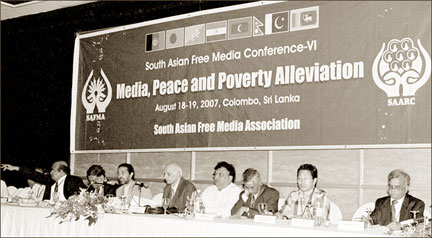Media, peace and poverty alleviation
Inaugural Session of SAFMA in Colombo:
by Ranga Chandrarathne
The inaugural session of the sixth South Asian Conference of South
Asia Free Media Association SAFMA was dominated by the themes of Media,
Peace and Poverty Alleviation.
|

Delegates at the South Asian Free Media Conference |
Apart from the usual business of the (SAFMA), various speakers who
addressed the session highlighted the important role that media can play
in poverty alleviation in the region which houses 60% of the world
population.
SAFMA Secretary General Imtiaz Alam, among other things, outlined the
activities of SAFMA and major policy issues the organisation faces. One
of the policy predicaments Imitiaz pointed out was the very definition
of SAFMA.
He pointed out that though SAFMA is a non-governmental body, it
differs on certain crucial parameters from typical NGOs. SAFMA, perhaps,
the largest body of professional journalist across the region, is not a
legal entity and does not receive funds in its name.
SAFMA is a professional organisation of journalists with a
professional agenda and the cause of peace in the region.
He emphasized that among the primary goals of the organisation are
the media development, free flow of and access to information,
professionally competent unbiased media in the region and promote a
cultural dialogue , environment for peace, cross-border cooperation
leading towards a South Asian union.
Highlight of the programme was the key-note address delivered by
Nobel Laureate Dr. Muhammad Yunus on 'Peace and Poverty'. Dr. Yunus
emphasized on the proposition that peace is inextricably linked to
poverty. The crust of the argument was that poverty has posed a serious
threat to peace and long term stability of the society.
He pointed out that ninety percent of word's income goes to 40 per
cent of population while sixty per cent of people live on only six per
cent of world income which he rightly articulated as 'not to be a
formula for peace'.
Dr. Yunus identified that the factors that pose a threat to peace is
unjust economic, social and political order, absence of democracy,
environmental degradation and the absence of human rights.
'Peace is absence of all human rights. The frustration, hostility and
anger generated by abject poverty cannot sustain peace in any society.
For building stable peace, we must find ways to provide opportunities
for people to live decent lives.' he stressed.
He described how he started now famous Grameen Bank or village bank
with his own money when he released debt burdened 42 victims in Jobra,
an impoverished village in Bangladesh. Grameen Bank was started in 1974.
So far, Grameen Bank has provided loans to nearly 7.2 million people
and mostly women, in 78,659 villages in Bangladesh. Grameen Bank
provides collateral free loans to the poor families and offers a host of
attractive savings, pension funds and insurance products for its
members.
Bank has given out loans totalling US$ 6.3 billion with an impressive
repayment rate of 98.61%. One of the salient arguments was that changing
the narrow definition of 'entrepreneur' to a broader one, the character
of capitalism can be radically changed, solving many unsolved social and
economic problems within the scope of the free market.
Let us suppose an entrepreneur , instead of having a single source of
motivation ( such as maximising profit), now has two sources of
motivation , which are mutually exclusive but equally compelling ? (a)
maximising profit and (B) doing good to people and world.
Each kind of motivation will lead to a separate kind of business. Let
us call the first type of business a profit-maximising business, and the
second type of business as social business.
Once social business is recognized in law, many existing companies
will come forward to create social business in addition to their
foundation activities. Many activities from non-profit sector will also
find this an attractive option.
Unlike the non-profit sector where one needs to collect donations to
keep activities going, a social business will be self-sustaining and
create surplus for expansion since it is non-loss enterprise. Social
business will go into a new type of capital market of its own, to raise
capital.
Almost all social and economic problems will be addressed through
social business. He further explained the new theory of social business
which could address all most all the social and economic problems.
Among the most inspiring proposition by Dr.Yunus is his idea of a
world free of poverty or a world with zero poverty. He believes that if
there is collective will this can be a reality. To me poor people are
like bonsai trees.
When you plant the best seed of the tallest tree in a flower-pot, you
get a replica of the tallest tree, only feet tall. There is nothing
wrong with the seed you planted, only the soil-base that is given to it
is too inadequate. All it needs to get poor people out of poverty is for
us to create an enabling environment for them. he said , proving that
zero poverty is possible.
[email protected] |
